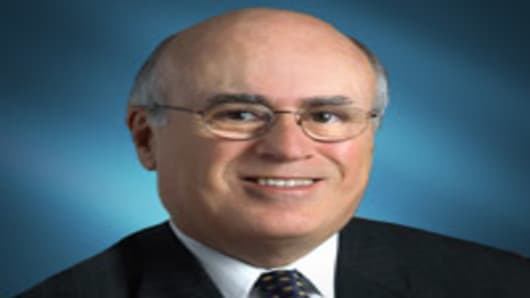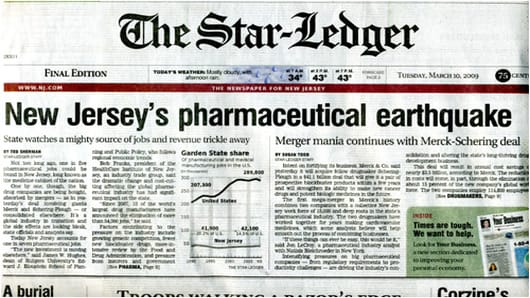They may have the same name, but America's oldest teenager Dick Clark and Merck's Chairman and CEO Dick Clark appear to have little else in common. One loves the camera, the other not so much.
Yesterday when Merck and Schering-Plough announced their merger, I assumed (a mistake, in hindsight) that Clark and SGP's Chairman and CEO Fred Hassan would at some point during the day be doing a live interview on CNBC. When such deals get done, that's usually the way it goes. Not this time. I was kept in a holding pattern for most of the day until a Merck spokesperson informed me in the afternoon that the executives had run out of time because they'd been doing so many interviews with other media outlets. "What about tomorrow morning?", I asked. Nope. Mr. Clark is on the road for the next week. The only consolation—and I hesitate to even call it that—is that neither guy did any TV yesterday. If they showed up on the competition, I'd have some splainin' to do to my bosses.
The companies apparently made Clark and Hassan available to the New Jersey Star-Ledger and The Wall Street Journal. I get so tired of this medium being treated like an afterthought by certain companies and execs—especially when they're doing a $41 billion deal! Merck recently spent some coin on building out a TV studio at its Whitehouse Station, NJ headquarters. It needed the capability because the HQ is kind of in the middle of nowhere. When the Vioxx litigation was going on and plaintiffs' lawyers like the outspoken, telegenic and media savvy Mark Lanier would regularly come on CNBC making all sorts of allegations, Merck couldn't get one of its execs on TV or, at least, on the phone fast enough to refute Lanier. A spokesperson told me Clark wasn't at HQ yesterday, but didn't give us the opportunity to get a mobile satellite truck rolling to wherever he was or to book a studio near his secret location.
At Merck's annual investor-analyst meeting late last year, Clark was booked to do a live interview with me. But the night before, the company asked if Ken Frazier, President of Global Human Health, could step in for Clark. Not a problem. In fact, I even bloggedabout what a good TV talker Frazier is. This time, though, a substitution wasn't acceptable (not that one was offered, although I notice that only Merck's top lawyer was made available to The New York Times for its coverage of the merger.)
The 41 billion bucks stop with Clark.
When Pfizer and Wyeth announced their deal in January, literally within minutes of the press release going out the two CEOs were on CNBC for a live, lengthy interview on "Squawk Box." Later, they did a news conference and made themselves available for interviews with our competition. They made sure everyone got what they needed. Why didn't Merck and Schering have a similar media plan in place? Certainly, the corporate communications team had to have sufficient notice to put something fair and workable together.
My first reaction to getting shut out yesterday was a popular three-letter text these days that begins with "W." But, in the interest of being a little more diplomatic, I'll just quote John Stossel from ABC's "20/20": Gimme a break!
P.S. Regarding my post yesterdayabout the impact of the big pharma consolidation wave on New Jersey, check out the front-page banner headline in today's NJ paper of record, the Star-Ledger: "New Jersey's Pharmaceutical Earthquake." Wow.



